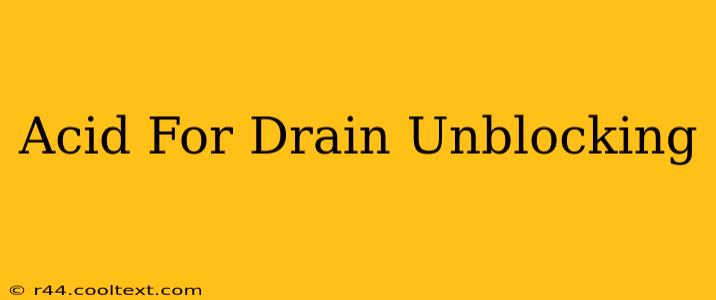Drain blockages are a common household problem, causing inconvenience and potential damage. While many reach for chemical drain cleaners, understanding the risks and benefits is crucial. This post focuses specifically on using acid for drain unblocking, exploring its effectiveness, safety precautions, and safer alternatives.
Understanding the Chemistry of Acid Drain Cleaners
Many commercial drain cleaners contain strong acids, often sulfuric acid or hydrochloric acid. These acids work by chemically reacting with organic matter causing the blockage, breaking it down and allowing the water to flow freely again. Acid drain unblockers are powerful, but improper use can lead to serious consequences.
How Acid Drain Cleaners Work
The strong acidity dissolves organic materials like hair, grease, and soap scum, effectively clearing the blockage. However, it's crucial to remember that this reaction is exothermic – meaning it produces heat. This heat, combined with the corrosive nature of the acid, can damage your pipes if not used correctly.
Risks Associated with Using Acid for Drain Unblocking
Strong acids are extremely corrosive. Direct contact can cause severe burns to skin and eyes. Inhalation of fumes can lead to respiratory problems. Moreover, acid drain cleaners can damage your pipes, especially older ones made of materials like galvanized steel or cast iron. The chemical reaction can weaken the pipes over time, leading to leaks or even complete pipe failure. Using acid on PVC pipes is generally discouraged as it can damage the plastic, causing cracks and leaks.
Environmental Concerns
Improper disposal of acid drain cleaners can pollute the environment. These chemicals can harm local ecosystems if they enter waterways. Always follow local regulations for disposal.
Safer Alternatives to Acid Drain Cleaners
While acid drain cleaners offer a quick solution, several safer and more environmentally friendly alternatives exist:
- Baking Soda and Vinegar: This natural combination is effective for minor blockages. Pour baking soda down the drain, followed by vinegar. The resulting fizzing reaction helps break down the blockage.
- Boiling Water: Pouring boiling water down the drain can melt away grease and soap scum, clearing minor blockages.
- Plunger: A simple plunger is often sufficient for clearing many types of blockages.
- Plumbing Snake: For more stubborn blockages, a plumbing snake can physically break up and remove the obstruction.
- Professional Plumber: For severe or recurring blockages, contacting a professional plumber is always the best option. They have the expertise and tools to address the problem safely and effectively.
When to Consider Acid Drain Cleaners (and how to use them safely)
Only consider using acid drain cleaners as a last resort and after attempting safer methods. If you decide to use an acid drain cleaner, always follow these precautions:
- Wear protective gear: Gloves, eye protection, and a respirator are essential.
- Ventilate the area: Open windows and doors to ensure good ventilation.
- Follow the manufacturer's instructions carefully: This includes the amount to use and the waiting time.
- Never mix different drain cleaners: This can create dangerous chemical reactions.
- Dispose of the product properly: Check local regulations for safe disposal methods.
By understanding the risks and benefits of using acid for drain unblocking, and by considering safer alternatives, you can maintain a clear and functional drainage system while prioritizing safety and environmental responsibility. Remember, prevention is key! Regular maintenance, such as avoiding pouring grease down the drain, can significantly reduce the likelihood of future blockages.

